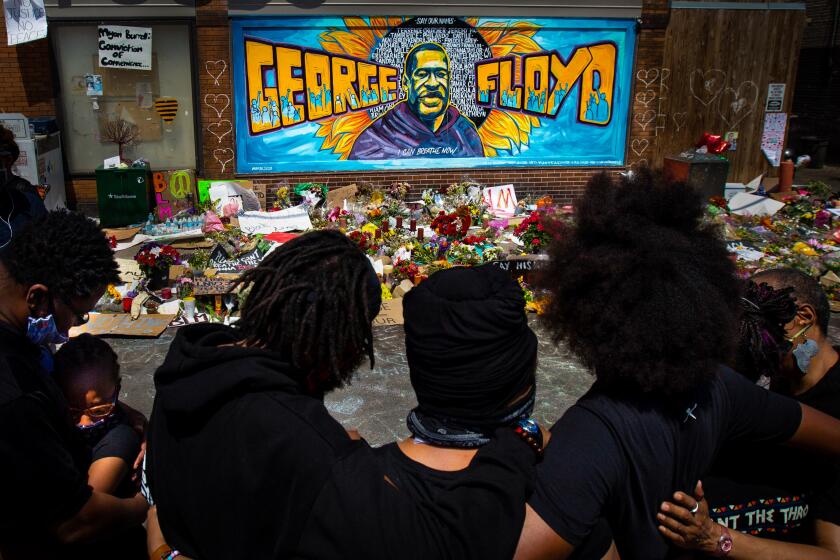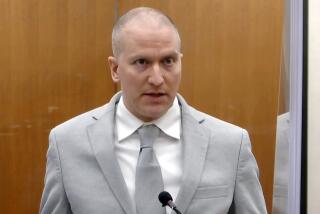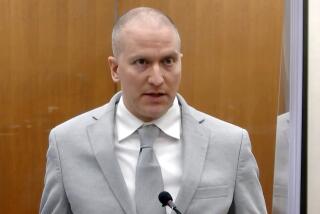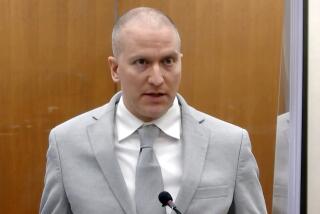Derek Chauvin’s fate in the death of George Floyd is now in the hands of the jury
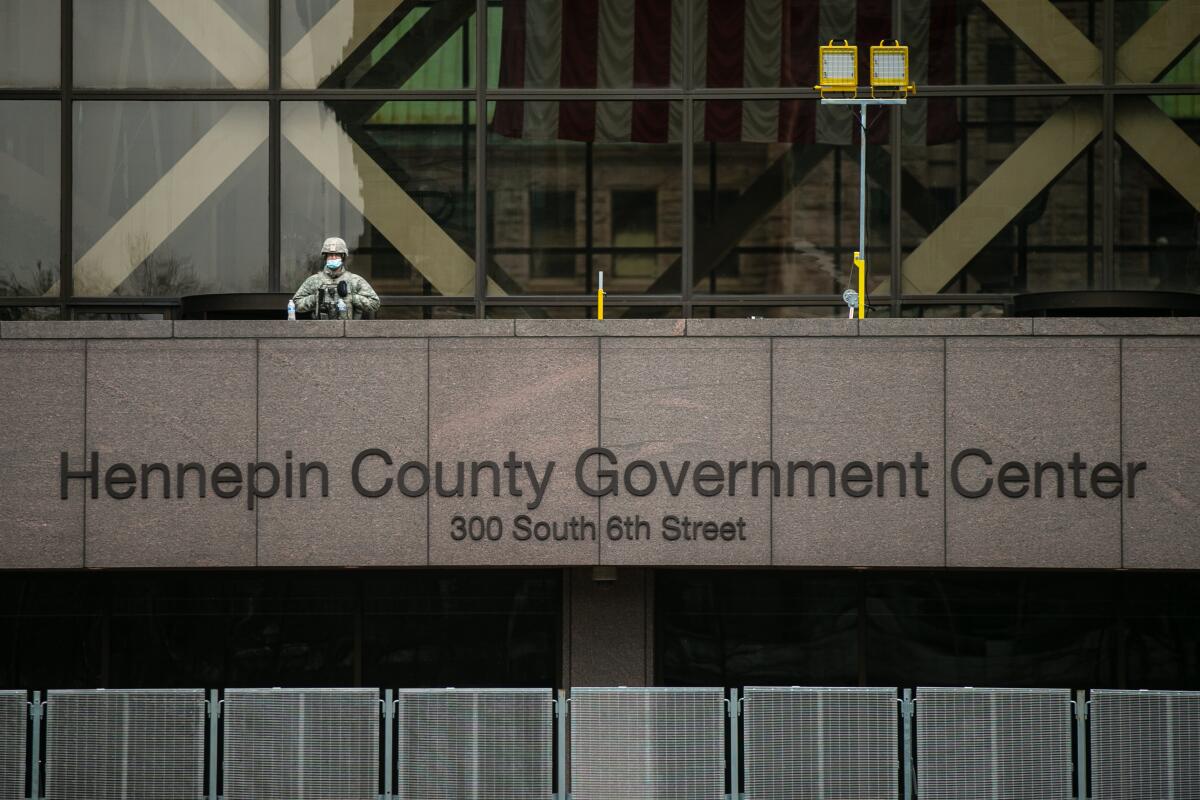
- Share via
MINNEAPOLIS — The attorneys in the trial of former Police Officer Derek Chauvin, who is charged with murdering George Floyd, finished closing arguments Monday, turning over to jurors a case that has become the centerpiece in a high-stakes drama over race and justice in a nation with a troubled history of police brutality.
After three weeks of emotional testimony — by witnesses ranging from medical experts to a 9-year-old girl who was buying snacks as Floyd died — Chauvin’s fate will be decided inside a room in a downtown Minneapolis courthouse that is guarded by razor wire and National Guard troops and ringed by demonstrators and boarded-up storefronts.
The May 25, 2020, death of Floyd, captured on bystander video, riveted a country torn by police violence against Black people. Over the past year, Americans young and old, of all races and religions, marched in massive protests for justice amid a pandemic and a bitterly divisive presidential election that further aggravated the nation’s racial tensions.
Now the jurors in the case — six white, four Black, two who identify as biracial — are deliberating the outcome of what is perhaps the most high-profile trial of policing since officers were acquitted in the graphic 1991 beating of Rodney King. The deliberations come only a week after another unarmed Black man, Daunte Wright, was shot and killed by police just 10 miles away, in Brooklyn Center, Minn.
In closing statements that lasted most of Monday, the prosecution and defense laid out their arguments. The case centers on whether the jury believes that Chauvin, who is white, killed Floyd by kneeling on the handcuffed Black man’s neck for more than nine minutes, or that Floyd died as a result of drug use and underlying health problems.
Chauvin — maskless, in a light-gray suit, blue tie and seated next to a bottle of hand sanitizer and behind plexiglass to prevent the spread of the coronavirus — looked on with little expression as his defense attorney Eric Nelson argued for an acquittal in the final moments of the trial.
But prosecutors said Chauvin recklessly squeezed the life from Floyd, who was caught between the officer’s knee and the ground. “The force was too much. He was trapped,” attorney Steve Schleicher said. “Trapped with the unyielding pavement underneath him.”
Prosecutors argued that Chauvin repeatedly violated police procedure and training when he arrived outside a corner store where Floyd had allegedly used a counterfeit $20 bill to buy cigarettes. During the trial, they repeatedly referred to the video of Floyd gasping and struggling to speak under what prosecutors said amounted to about 90 pounds of pressure, while Chauvin appeared calm, with his left hand in his pocket.
Schleicher told the jury: “What the defendant did to George Floyd killed him.”
Chauvin is charged with manslaughter, second-degree murder and third-degree murder.
Guilty verdicts must be unanimous. This means that on each count, the defense need raise doubt only in the mind of a single juror. The charges carry maximum sentences of 40 years for second-degree unintentional murder, 25 years for third-degree murder and 10 years for second-degree manslaughter. Sentencing guidelines call for far less time, including 12½ years on either murder count.
In nearly three hours of closing arguments, Nelson said Chauvin followed police procedure and acted reasonably when he restrained Floyd last May.
“He walks onto a scene; he sees active resistance occurring,” said Nelson while playing body-camera video of Chauvin’s encounter with Floyd. The lawyer said Chauvin had “techniques at his disposal” that included controlled takedowns and neck restraints to subdue a suspect who was not complying with police orders.
Chauvin’s defense team throughout the trial has argued that Floyd put himself at risk by swallowing fentanyl and methamphetamine and that underlying heart issues led to his death.
The case — the first televised trial in Minnesota history — has set this city on edge and gripped the nation with questions about policing at a time when many states are moving to hold law enforcement officers more accountable for their actions.
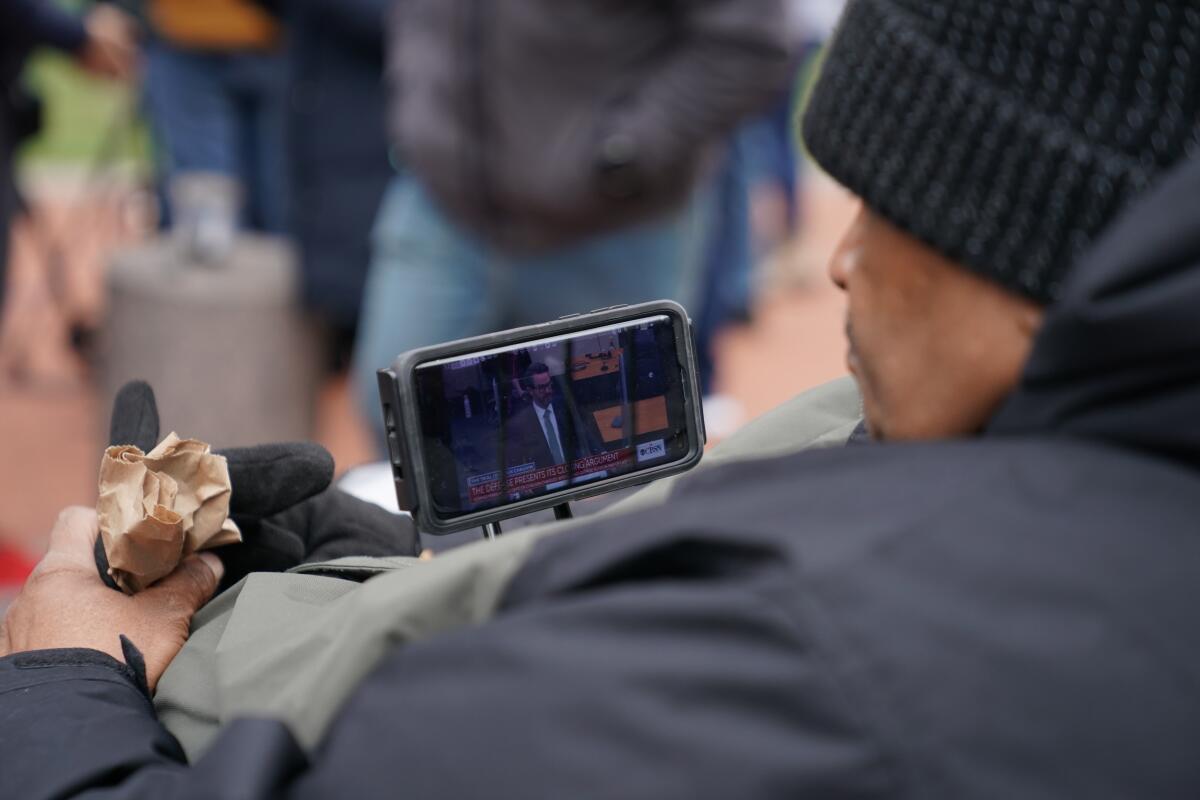
“A reasonable police officer wants to keep his fellow officers safe,” said Nelson, who argued that volatile bystanders contributed to a chaotic situation that justified Chauvin’s actions before and during the time he knelt on Floyd’s neck to make an arrest. Chauvin declined to take the stand in his own defense.
Nelson stressed that Chauvin’s actions were in line with his department training, saying they amounted to “an authorized use of force, as unattractive as it may be.” But perhaps in a strategy to convince the jury not to convict his client on the more severe charges, Nelson said that “officers are human beings capable of making mistakes.”
In a rebuttal to Nelson, prosecutor Jerry Blackwell urged jurors to use “common sense” while they deliberated. “The only witness that will be talking to you when you’re back in deliberation ... is common sense; that witness is common sense,” Blackwell said.
During the testimony phase of the trial, the prosecution called dozens of witnesses: bystanders, police officers and medical experts. Several officers testified that Chauvin’s force was excessive.
Blackwell reminded jurors of the diverse mix of people who witnessed Floyd’s final moments: a man who stopped his van to see what was happening, an off-duty firefighter out for a walk, the store clerk who identified the $20 bill. All of them were forever changed by Floyd’s death on a street corner that has since been transformed into a memorial decorated with flowers, murals and placards.
Schleicher said Monday that Chauvin’s actions were not in line with the principles of the Minneapolis police.
It’s a club no one wants to join. These Black families have lost loved ones to police brutality. The Chauvin trial could bring justice.
“The motto of the Minneapolis Police Department is to protect with courage and to serve with compassion,” he said. “But George Floyd was not a threat to anyone. He was not trying to hurt anyone. He was not trying to do anything to anyone.
“Facing George Floyd that day — that did not require one ounce of courage,” he added. “And none was shown on that day. All that was required was a little compassion. And none was shown on that day.”
Schleicher implored jurors to reflect on what they had seen in the video.
“Believe your eyes,” he said.
In a last-ditch effort, Nelson called for a mistrial based in part on comments made by U.S. Rep. Maxine Waters (D-Los Angeles), who traveled here over the weekend and told reporters “we’ve got to get more confrontational” if Chauvin is convicted of a lesser charge than murder.
Judge Peter Cahill rejected Nelson’s request, calling Waters’ comments “abhorrent” and adding, “I wish elected officials would stop talking about this case.”
Outside the courthouse, as a light snow fell over Minneapolis, Floyd’s family members and activists held a prayer vigil. His youngest brother, Rodney Floyd, thanked the local community for supporting the family’s call for justice.

“The activists that stepped up, so many people stepped up in this city, standing up for George, for what’s right, what they believe in,” he said. “Because they want to make sure that their family members are not another hashtag.”
He stood flanked by the Rev. Al Sharpton and Benjamin Crump, a civil rights attorney representing the family.
Sharpton, who eulogized Floyd, offered a prayer.
“We are ... at a reflection point where this country must come to terms with those that feel that blue uniforms make them above the law, and blue jeans make them subject to the law,” he said. “We are fighting to make both blue uniforms and blue jeans both subject to the law. And you let George Floyd become a symbol of that.”
The closing arguments came amid renewed pain in the Minneapolis suburb of Brooklyn Center over the death of Wright.
The officer in that case, a 26-year veteran, was charged with second-degree manslaughter after officials said she mistook her gun for her Taser. Protesters have taken to the streets in the Twin Cities, calling on prosecutors to expand the charges to include murder. Some 3,000 National Guard troops have been called up to keep order after the killings — almost a year apart — of the two Black men.
Worried that the Chauvin verdict could lead to a repeat of the arson and vandalism that shook Minneapolis in the days after Floyd’s death, Gov. Tim Walz declared a “peacetime emergency.”
Back inside the courthouse, Cahill told the jurors to be thorough in their deliberations. The 12 men and women then exited the courtroom.
More to Read
Sign up for Essential California
The most important California stories and recommendations in your inbox every morning.
You may occasionally receive promotional content from the Los Angeles Times.
